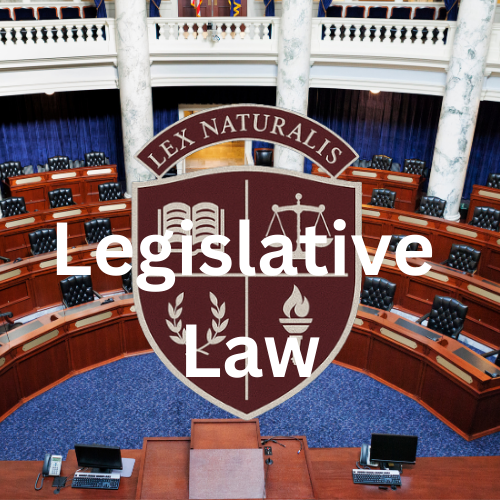The Cost of Bad Statutes: How Ambiguity Destroys Capital Formation
- Dr. Byron Gillory
- Sep 14
- 4 min read

I. Law as the Foundation of Property and Investment
It hath ever been the settled truth of jurisprudence that law is the guardian of property. For without secure ownership, enforceable contracts, and predictable remedies, men dare not plant, nor build, nor invest. The farmer who doubts whether his field is his own will not sow; the merchant who fears that contracts may be voided will not trade; the entrepreneur who trembles at uncertain decrees will not risk his capital.
Thus, the prosperity of nations rest not on wealth already in hand, but upon the confidence that wealth, once produced, shall be protected. Law is the soil in which capital is planted, the shield by which labor’s fruits are preserved, and the framework within which markets flourish.
But when statutes are framed with ambiguity, when their words admit of many meanings or their provisions contradict, the soil of law is poisoned. Capital withdraweth, enterprise is chilled, and wealth withereth.
II. Ambiguity as an Economic Vice
Ambiguity in statutes is not a mere defect of style; it is a malady of justice with grave economic consequence. For ambiguity createth uncertainty, and uncertainty is the enemy of investment.
The Austrian economists have long taught that capital formation is a work of time and foresight. The saver, foregoing present enjoyment, entrusts his resources to future production in the expectation of lawful return. But this delicate process requires stability. If statutes governing property, contracts, or taxation are obscure, the investor cannot know what rules shall bind him. The future becomes a fog, and capital, rather than advancing, retreateth.
Thus ambiguity in law is not neutral; it actively destroys the incentives to form capital. What could have been factories, farms, and enterprises remain idle savings, or flee to jurisdictions where law speaketh plainly.
III. Judicial Usurpation and Administrative Tyranny
Ambiguous statutes do not remain dormant; they invite others to seize power. Judges, compelled to interpret unclear provisions, may in effect legislate from the bench. Administrators, granted vague mandates, may extend their dominion beyond the intent of legislators.
This usurpation, born of ambiguity, undermines the rule of law and leaves the economy hostage to shifting interpretations. A businessman cannot plan for ten years when courts may tomorrow discover a “new meaning” in an old statute. A farmer cannot plant for harvest when regulators may invent burdens unforeseen.
The consequence is paralysis. Capital that might have been risked for future gain is hoarded, consumed, or spirited away.
IV. The Cost of Bad Statutes
The cost of bad statutes cannot be measured merely in the fees of litigation or the delays of bureaucracy. Their cost is found in lost opportunities: the factory never built, the ship never launched, the mine never opened. It is found in jobs not created, wages not raised, communities not enriched.
Consider the statutes of wage and price controls in ancient Rome, so vague and contradictory that commerce collapsed into black markets. Consider modern tax codes, swollen with ambiguity, which consume billions in compliance and drive investment abroad. In every case, the unseen cost is capital destroyed by uncertainty.
As Bastiat taught, it is not only what is seen—the trials, the disputes, the wasted hours—but what is unseen: the capital never formed, the prosperity never attained.
V. Legislative Law as the Cure
Herein sits the noble calling of Legislative Law. The Policy Jurist, schooled in both jurisprudence and economics, is the physician of the statute-book. He knows that every ambiguous phrase is a parasite, draining confidence from markets; every contradiction is a poison, corroding capital.
Thus his art is to craft statutes with clarity, precision, and foresight:
Clear in text, so that citizens may know their duties.
Consistent in structure, so that laws harmonize rather than conflict.
Predictable in meaning, so that investors may plan with confidence.
In so doing, Legislative Law preserves not only justice but prosperity. It is the unseen foundation of capital formation, the silent guardian of enterprise.
VI. Gillory & Associates: Guardians of Capital Through Clarity
At Gillory & Associates, we declare that clarity in law is not a luxury, but an economic necessity. Through the Blackwell Institute for Legal Studies, we train jurists to see statutes not as political trophies, but as instruments of order whose ambiguity bears immense cost.
For every ambiguous statute is a barrier to investment; every clear statute is an invitation to capital. If liberty is the seed of prosperity, then clarity in law is the rain by which it groweth.
VII. Conclusion: Clarity as the Wealth of Nations
The wealth of nations is not secured by mines, nor fields, nor even by labor alone, but by the confidence that law will protect the fruits of labor, the integrity of contracts, and the security of property. Ambiguity in statutes destroyeth this confidence, and thereby destroyeth capital.
Thus we conclude: the cost of bad statutes is measured not only in courtrooms, but in the factories never built, the ships never launched, the farms never planted. To draft clearly is to invite capital; to draft ambiguously is to repel it.
This is why Legislative Law must be professionalized, why statutes must be crafted with the precision of architects, and why Gillory & Associates stands at the forefront of this vocation: to preserve not only justice, but prosperity itself.
Comments